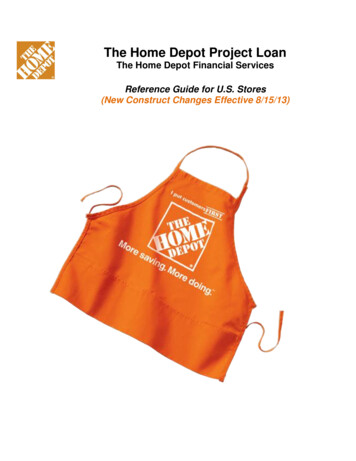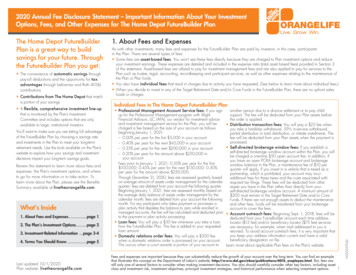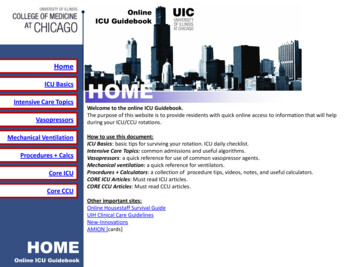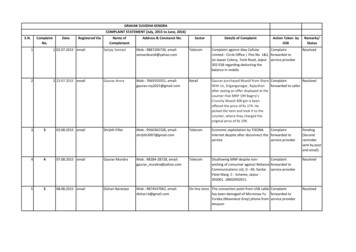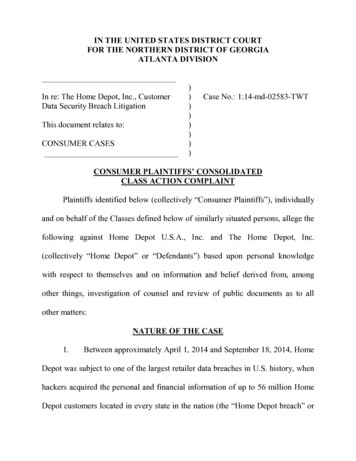
Transcription
Case 1:14-md-02583-TWT Document 93 Filed 05/01/15 Page 1 of 187IN THE UNITED STATES DISTRICT COURTFOR THE NORTHERN DISTRICT OF GEORGIAATLANTA DIVISIONIn re: The Home Depot, Inc., CustomerData Security Breach LitigationThis document relates to:CONSUMER CASES))))))))Case No.: 1:14-md-02583-TWTCONSUMER PLAINTIFFS’ CONSOLIDATEDCLASS ACTION COMPLAINTPlaintiffs identified below (collectively “Consumer Plaintiffs”), individuallyand on behalf of the Classes defined below of similarly situated persons, allege thefollowing against Home Depot U.S.A., Inc. and The Home Depot, Inc.(collectively “Home Depot” or “Defendants”) based upon personal knowledgewith respect to themselves and on information and belief derived from, amongother things, investigation of counsel and review of public documents as to allother matters:NATURE OF THE CASE1.Between approximately April 1, 2014 and September 18, 2014, HomeDepot was subject to one of the largest retailer data breaches in U.S. history, whenhackers acquired the personal and financial information of up to 56 million HomeDepot customers located in every state in the nation (the “Home Depot breach” or
Case 1:14-md-02583-TWT Document 93 Filed 05/01/15 Page 2 of 187“Home Depot data breach”). Home Depot management’s attitude towards datasecurity in the years and months leading up to the breach can best be described aswillfully dismissive. Notwithstanding the warnings and pleas of many of itsemployees who recognized the vulnerability of millions of customers’ sensitiveinformation stored in Home Depot’s systems, Home Depot management refused toupgrade its security systems, refused to follow recommendations of informationtechnology (“IT”) employees and experts, and suffered from ineffective leadershipin key IT security positions within the organization. Home Depot customers acrossthe United States have suffered real and imminent harm as a direct consequence ofHome Depot’s conduct, which includes (a) refusing to take adequate andreasonable measures to ensure its data systems were protected; (b) refusing to takeavailable steps to prevent the breach from happening; (c) failing to disclose to itscustomers the material facts that it did not have adequate computer systems andsecurity practices to safeguard customers’ personal and financial information; and(d) failing to provide timely and adequate notice of the Home Depot data breach.2.As a result of the Home Depot data breach, the payment card data andpersonal information of 56 million Home Depot customers has been exposed tocriminals for misuse. Remarkably, Home Depot would not have even discoveredthe breach when it did except for an Internet blog post by a data security watchdogthat reported massive batches of Home Depot customers’ payment cards were2
Case 1:14-md-02583-TWT Document 93 Filed 05/01/15 Page 3 of 187offered for sale on online black markets to be purchased by criminals across theglobe. The injuries suffered by Consumer Plaintiffs and the proposed Classes as adirect result of the Home Depot data breach include:a. unauthorized charges on their debit and credit card accounts;b. theft of their personal and financial information;c. costs associated with the detection and prevention of identity theftand unauthorized use of their financial accounts;d. loss of use of and access to their account funds and costsassociated with inability to obtain money from their accounts orbeing limited in the amount of money they were permitted toobtain from their accounts, including missed payments on bills andloans, late charges and fees, and adverse effects on their creditincluding decreased credit scores and adverse credit notations;e. costs associated with time spent and the loss of productivity fromtaking time to address and attempt to ameliorate, mitigate and dealwith the actual and future consequences of the data breach,including finding fraudulent charges, cancelling and reissuingcards, purchasing credit monitoring and identity theft protectionservices, imposition of withdrawal and purchase limits oncompromised accounts, and the stress, nuisance and annoyance ofdealing with all issues resulting from the Home Depot data breach;f. the imminent and certainly impending injury flowing frompotential fraud and identity theft posed by their payment card andpersonal information being placed in the hands of criminals andalready misused via the sale of Consumer Plaintiffs’ and Classmembers’ information on the Internet black market;g. damages to and diminution in value of their personal and financialinformation entrusted to Home Depot for the sole purpose ofpurchasing products and services from Home Depot and with themutual understanding that Home Depot would safeguard3
Case 1:14-md-02583-TWT Document 93 Filed 05/01/15 Page 4 of 187Consumer Plaintiffs’ and Class members’ data against theft andnot allow access to and misuse of their information by others;h. money paid for products and services purchased at Home Depotstores during the period of the Home Depot data breach in thatConsumer Plaintiffs and Class members would not have shoppedat Home Depot had Home Depot disclosed that it lacked adequatesystems and procedures to reasonably safeguard customers’financial and personal information and had Home Depot providedtimely and accurate notice of the Home Depot data breach;i. continued risk to their financial and personal information, whichremains in the possession of Home Depot and which is subject tofurther breaches so long as Home Depot fails to undertakeappropriate and adequate measures to protect Consumer Plaintiffs’and Class members’ data in its possession.3.Examples of these harms caused to Home Depot customers as a directand foreseeable consequence of Home Depot’s conduct include the experiences ofthe following representative Consumer Plaintiffs, as well as the experiences of theother representative Consumer Plaintiffs in this Complaint:4.Plaintiff Bruce Holdridge is a resident of Cave Creek, Arizona andwas an Arizona resident during the period of the Home Depot breach. PlaintiffHoldridge shopped at a Home Depot retail store in Arizona between April 1 andSeptember 18, 2014 by swiping his Home Depot credit card through Home Depotpoint-of-sale devices to make payment. Plaintiff Holdridge learned of the HomeDepot breach on or about September 15, 2014 when, after seeing media coverage,he called Home Depot and discovered fraudulent charges for approximately 8,500reflected on his Home Depot credit card account. Plaintiff Holdridge then opened a4
Case 1:14-md-02583-TWT Document 93 Filed 05/01/15 Page 5 of 187fraud investigation with Home Depot and closed his credit card account. HomeDepot’s fraud investigation took approximately three months to conclude. Sinceexperiencing those fraudulent charges, Plaintiff Holdridge has receivedapproximately 65 letters from the three credit bureaus showing repeated fraudulentattempts to use his name and credit history to open credit lines. Due to identitythieves submitting fraudulent credit applications in his name, Plaintiff Holdridgealso has spent considerable time responding to numerous calls from would-belenders seeking validation of his identity. In addition, since on or about September16, 2014, Plaintiff Holdridge regularly receives phishing scam calls attempting totrick him into providing additional personal and financial information. PlaintiffHoldridge filed a report regarding the identity theft with the Phoenix, Arizonapolice department and paid to have a seven-year freeze placed on his credit reportswith all three credit bureaus (requiring that he provide a police report) in an effortto prevent or mitigate additional identity theft activity. As a result of the HomeDepot breach, Plaintiff Holdridge has spent over 320 hours trying to resolve theseongoing identity theft and financial problems.5.Plaintiff Nathanial Newton is a resident of Indio, California and was aCalifornia resident during the period of the Home Depot data breach. PlaintiffNewton shopped at a Home Depot retail store in California between April 1 andSeptember 18, 2014 by swiping his debit or credit cards through Home Depot5
Case 1:14-md-02583-TWT Document 93 Filed 05/01/15 Page 6 of 187point-of-sale devices to make payment. Since the commencement of the HomeDepot breach, Plaintiff Newton has been the target of numerous instances ofidentity theft and fraud. With the information obtained from Home Depot,criminals used Plaintiff Newton’s identity to fraudulently seek lines of credit fromnumerous financial institutions in Spokane, Washington. Plaintiff Newton alsoreceived a call from a telephone service provider that eight new telephone lineswere opened under his name in Chattanooga, Tennessee. Plaintiff Newton’sidentity was also fraudulently used to open a 10,000 line of credit at a motorcycleshop in Cleveland, Tennessee. Those acts of identity theft caused PlaintiffNewton’s credit score to be lowered and he was consequently denied refinancingon the mortgage of his house. Plaintiff Newton now pays approximately 40 permonth for credit monitoring and identity theft protection in an effort to prevent ormitigate further harm to his credit and finances. On or about November 6, 2014,Plaintiff Newton received an e-mail notification from Home Depot regarding thebreach. As a result of the Home Depot data breach, Plaintiff Newton expendedapproximately 40 hours, and continues to expend significant time, addressingissues arising from the breach and monitoring for fraud.6.Plaintiff Ronald Castleberry, a retired law enforcement official, is aresident of Tallahassee, Florida and was a Florida resident during the period of theHome Depot data breach. Plaintiff Castleberry shopped at a Home Depot retail6
Case 1:14-md-02583-TWT Document 93 Filed 05/01/15 Page 7 of 187store in Florida between April 1 and September 18, 2014 by swiping his credit cardthrough Home Depot point-of-sale devices to make payment. On or about October18, 2014, Plaintiff Castleberry’s credit card was declined while he was attemptingto make a purchase. Plaintiff Castleberry’s financial institution had placed asecurity hold on his credit card account after fraudulent purchases on aninternational travel website totaling approximately 1,800 were identified on hisaccount. Due to the Home Depot data breach, Plaintiff Castleberry lost access tohis line of credit for several weeks. In addition, throughout the first three months of2015, Plaintiff Castleberry was targeted by identity thieves who made severalattempts to open fraudulent lines of credit, financial assistance accounts, and bankaccounts in Plaintiff Castleberry’s name. As a result of the Home Depot databreach, Plaintiff Castleberry spent approximately 30 hours addressing issuesarising from the breach and monitoring his credit card and other accounts for fraud.Plaintiff Castleberry never received any individual notification from Home Depotregarding the breach or Home Depot’s free credit monitoring offer.7.Plaintiffs Martha and Brandyon Brantley are a married coupleresiding in Dallas, Georgia and were Georgia residents during the period of theHome Depot breach. Mr. Brantley shopped at a Home Depot retail store in Georgiabetween April 1 and September 18, 2014 by swiping his debit card through HomeDepot point-of-sale devices to make payment through the Brantleys’ joint debit7
Case 1:14-md-02583-TWT Document 93 Filed 05/01/15 Page 8 of 187card account. On or about September 19, 2014, Mrs. Brantley received anelectronic communication from her bank indicating their debit account had beenoverdrawn and had a negative balance. Mrs. Brantley immediately reviewed theirdebit account activity and discovered fraudulent charges totaling more than 500.Although the bank eventually reimbursed the Brantleys for these stolen funds, theprocess took approximately one week. As a result, the Brantleys were compelled toborrow money to pay bills while their debit card was frozen. The Brantleys’ bankis a small financial institution with limited hours of operation, making it difficultfor them to travel there in person to fill out paperwork and obtain cash. As a resultof the Home Depot data breach, Mrs. Brantley has spent approximately 10 hoursaddressing issues arising from the breach. The Brantleys never received anyindividual notification from Home Depot regarding the breach or Home Depot’sfree credit monitoring offer.8.Plaintiffs Luis and Kitaisha Araujo are a married couple residing inLansing, Kansas and were Kansas residents during the period of the Home Depotdata breach. Mr. Araujo shopped at a Home Depot retail store in Kansas betweenApril 1 and September 18, 2014 by swiping his debit card through Home Depotpoint-of-sale devices to make payment. In September 2014, the Araujos identified 1,144.54 in fraudulent charges on their debit account statement, which causedtheir debt account to be overdrawn and to incur 150 in overdraft fees. Mr. and8
Case 1:14-md-02583-TWT Document 93 Filed 05/01/15 Page 9 of 187Mrs. Araujo experienced significant inconveniences over a nearly two-week periodwhile they waited for Mr. Araujo’s replacement card to be issued. Although thefraudulent charges and overdraft fees were ultimately reimbursed to the Araujos’debit account, they were without access to their funds for a period of time and hadto borrow money just to get by and provide for their children. The bank imposed atemporary spending limit of 300 per transaction without notifying Mr. and Mrs.Araujo, which resulted in Mrs. Araujo’s card being declined at the grocery store.Mr. and Mrs. Araujo had to juggle one card between the two of them and Mr.Araujo had to skip lunch on a couple of occasions because he did not have cash oraccess to their debit funds. On or about November 9, 2014, Mr. Araujo received ane-mail notification from Home Depot regarding the breach. Mr. and Mrs. Araujoincurred unreimbursed late and/or declined payment fees as a result of failedautomatic bill payments tied to their debit account. They also spent approximatelyseven hours dealing directly with their bank and approximately eight additionalhours on other matters arising from the Home Depot breach.9.Plaintiff Paula Ridenti is a resident of Somerville, Massachusetts andwas a Massachusetts resident during the period of the Home Depot breach.Plaintiff Ridenti shopped at a Home Depot retail store in Massachusetts betweenApril 1 and September 18, 2014 by swiping her credit card through Home Depotpoint-of-sale devices to make payment. Plaintiff Ridenti learned of the Home9
Case 1:14-md-02583-TWT Document 93 Filed 05/01/15 Page 10 of 187Depot breach on or about October 30, 2014, when she received a letter from herfinancial institution indicating fraudulent activity on her account. When PlaintiffRidenti contacted the financial institution, she was informed the fraudulentactivity—a 480.93 charge at a wholesale store on October 29, 2014—was relatedto the Home Depot breach. She was further informed that a male individual used afake credit card with her account number to make the fraudulent purchase. PlaintiffRidenti’s line of credit was frozen and not reinstated until reversal of the fraudulentcharges on or about December 11, 2014. Plaintiff Ridenti was subsequently deniedcredit as a result of this fraudulent activity on her credit report. She has since paidthe credit bureaus to place a freeze on her credit report to, among other things,limit or mitigate further damage to her ability to obtain credit. Plaintiff Ridentiincurred unreimbursed expenses and spent over 30 hours addressing issues arisingfrom the Home Depot breach related to her finances and credit.10.Plaintiff Catherine Adams, a widow who served as a 12-year U.S.Army veteran staff sergeant, now a retired receptionist and volunteer Sundayschool teacher living on a fixed income, is a resident of Charlotte, North Carolinaand was a North Carolina resident during the period of the Home Depot breach.Plaintiff Adams shopped at a Home Depot retail store in North Carolina betweenApril 1 and September 18, 2014 by swiping her debit card through Home Depotpoint-of-sale devices to make payment. On or about January 31, 2015, Plaintiff10
Case 1:14-md-02583-TWT Document 93 Filed 05/01/15 Page 11 of 187Adams went on a trip to Winston-Salem to visit her aunt in hospice care. On herdrive home, she attempted to purchase gas and her debit card was declined. Shewas stranded without access to her funds to purchase the fuel she needed, and hadto borrow money from strangers to make it home. Plaintiff Adams later called herbank, which informed her that a new debit card had been issued because of theHome Depot data breach. She soon discovered that someone had fraudulently usedher debit account information to charge 337.89 at a grocery store in Orlando,Florida. When she went to Home Depot to report the fraud, Home Depot deniedany issue and said it was only an issue with her bank. Plaintiff Adams subsequentlyreceived alerts from the three major credit bureaus that six fraudulent creditapplications were made in her name, and showed up on her credit reports,including a fraudulent application made at a Lexus car dealership. Further, as aresult of the freeze on her bank account that prevented timely automatic payment,Plaintiff Adams’ auto insurance provider informed her that her policy would becancelled for nonpayment of premium “at 12:01 a.m.” the same night, and that shehad to take immediate action to prevent cancellation. Because her account wasfrozen, Plaintiff Adams had to borrow money to pay her auto insurance premium.Also, delivery of Plaintiff Adams’ blood pressure medication was delayed byapproximately one week because her account was frozen and other automatic billpayments were rejected. As a result of the Home Depot breach, Plaintiff Adams11
Case 1:14-md-02583-TWT Document 93 Filed 05/01/15 Page 12 of 187spent over 50 hours addressing issues arising from the breach and checking heraccount for additional fraud. Plaintiff Adams never received any individualnotification from Home Depot regarding the breach or Home Depot’s free creditmonitoring offer.11.Plaintiff John Simon is a resident of Whitewright, Texas and was aTexas resident during the period of the Home Depot breach. Plaintiff Simonshopped at a Home Depot retail store in Texas between April 1 and September 18,2014 by swiping his debit card through Home Depot point-of-sale devices to makepayment. On or about September 23, 2014, Plaintiff Simon received an e-mailnotification from Home Depot regarding the breach. On or about September 25,2014, Plaintiff Simon received a call from his credit union’s fraud department andlearned that over 2,000 was fraudulently charged to his debit card account. Thestolen funds were not reimbursed to Plaintiff Simon’s account until October 7,2014. Plaintiff Simon lost access to the balance of the stolen funds during thecredit union’s fraud investigation. Plaintiff Simon also had to cancel a businessmeeting in order to visit his credit union and fill out paperwork related to the fraudinvestigation. As a result of the Home Depot breach, Plaintiff Simon purchasedcredit monitoring and identity theft prevention and paid approximately 10 permonth for several months after the breach, which was not reimbursed. Plaintiff12
Case 1:14-md-02583-TWT Document 93 Filed 05/01/15 Page 13 of 187Simon incurred unreimbursed expenses and spent over 20 hours addressing issuesarising from the Home Depot breach.12.Consumer Plaintiffs retain a significant interest in ensuring that theirinformation is protected from further breaches, and seek to remedy the harms theyhave suffered on behalf of themselves and similarly situated consumers whosepersonal and financial information was stolen as a result of the Home Depot databreach. Consumer Plaintiffs assert claims against Home Depot for violations ofstate consumer protection statutes, state data breach statutes, negligence,
September 18, 2014 by swiping his Home Depot credit card through Home Depot point-of-sale devices to make payment. Plaintiff Holdridge learned of the Home Depot breach on or about September 15, 2014 when, after seeing media coverage, he called Home Depot a
